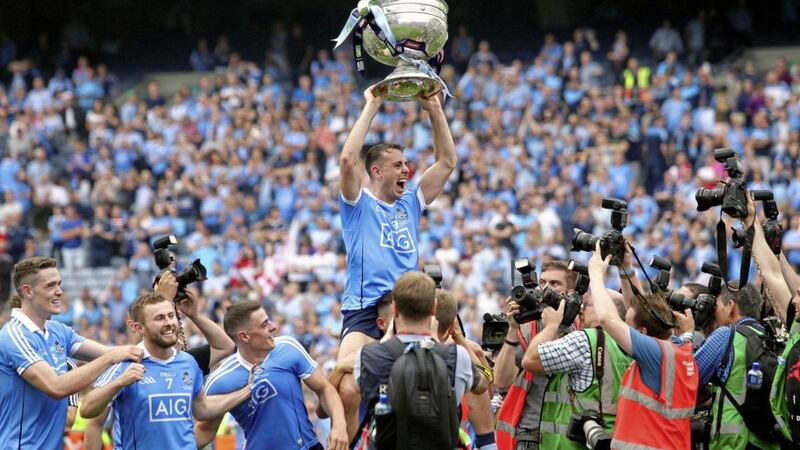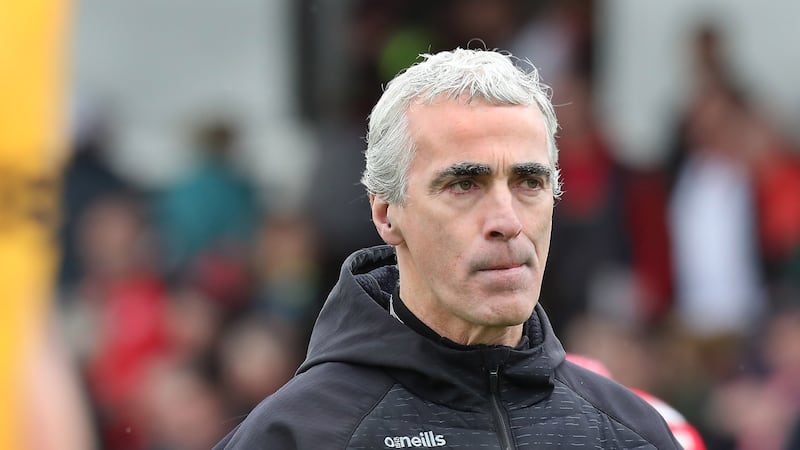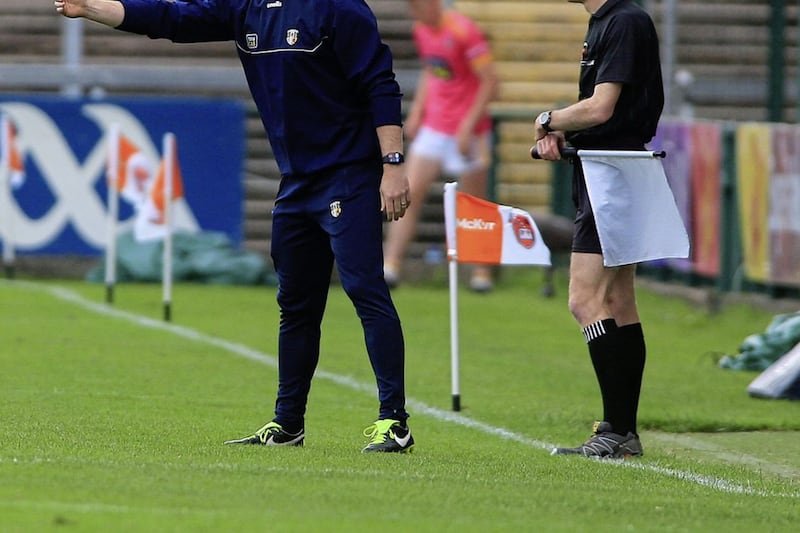The fitting end to an excellent Ulster Championship, good qualifier games with big crowds and even an unexpectantly competitive Munster final meant there was much to encourage a rare sense of real positivity in the long-suffering football fan.
Unfortunately, I made the mistake of watching the Leinster final and, to compound things, view RTE’s ‘special report’ on Dublin’s dominance and what some have called the financial doping behind it.
RTE’s report was well-timed and appropriately focused; however, it had the critical level and tone of a BBC correspondent investigating the Royal family.
Even allowing for this, the factual disparity between the support given to Dublin from the GAA compared with every other county is hard to accept especially when key figures involved show a complete lack of awareness regarding the inherent unfairness the rest of the country is being forced to endure.
When discussing Dublin, there are several issues which serve to stifle the conversation.
For many in Irish society, the very chat of money, who has most or regarding the benefits that money brings or how money is a potent tool when seeking success is in a sense immoral or vulgar.
We want to believe that we live in a grand meritocracy where there is inherent fairness.
On top of this, none of us wants to be the child in the playground crying “that’s not fair”.
We would rather be seen to get on with things and not back down from any challenge, fair or not.
Then there is the whole issue that any questioning of the factors behind Dublin’s success is somehow disrespecting the achievements of what is an exceptional group of players and management team led in an understated but hugely impressive manner by Jim Gavin.
Yet none of this should detract from what is a legitimate discussion about the way that the cards have been stacked monumentally in Dublin’s favour.
In the report by RTE and, not for the first time, the GAA presented a ‘nothing to see here’ front.
John Horan, the GAA president, stated that the key factor behind the success wasn’t money at all but the efforts of volunteers and organisation at club level and, to really put the cherry on top, said they should be used as a model for others to emulate.
Meanwhile, John Costello, the Dublin CEO, took a similar line.
On the one hand supporting Horan’s assertion regarding volunteers, club and structures but on the other hand refusing to countenance any suggestion that the funding is reduced and pointing out that "we have huge challenges in Dublin. We have developing areas that we have no presence in; there are areas like Cherrywood, Hollystown and Adamstown."
Weep for you John, tough times indeed.
Besides, which is it then, the funding or the volunteers? And is this really a reasonable use of the GAA’s limited resources?
Mr Costello badly needs to get out and around the rest of the country to see what the reality is away from the gravy train.
All involved need to stop embarrassing themselves in denying the link between money and success. The correlation is evidenced throughout the world of sport and the GAA is no different.
Does it explain every success, or does it prevent the occasional exceptions to the rule?
Of course not, but to try to explain Dublin’s current dominance as a cyclical thing due to an outstanding team or due to great efforts of volunteers is either disingenuous or pure ignorance.
Whichever, it does not reflect well and is increasingly hard for the rest to stomach.
In fairness the Strategic Review of 2002 which can be seen as the starting point of the revolution was not about making Dublin successful; instead it was focused on the decreased participation levels in the capital in the face of rapid population growth and more effective efforts from other sports.
To improve the situation, various strategies were suggested and a ‘necessary’ funding figure of £3.5million a year identified.
As a quick aside, that makes last year’s commitment of £1million spread across 5 years to the Gaelfast project in Antrim look a tad miserly.
The strategy has worked and then some.
Yet the money train keeps going to the Capital where, despite being the one county in the country who could easily support a fully professional team such is their financial strength, they continue getting sums of money equivalent to what other whole provinces get.
In fact, unbelievably, the proportion is increasing.
In 2016 it was 14% of the overall pot, last year this had risen to 22%.
All this surely highlights the farce in the likes of Horan and Costello saying to everyone to follow the Dublin blueprint based on club activities and volunteers while on the one hand suggesting money was not behind their success and on the other hand claiming that more money is still required.
It really does beggar belief.
Then I came across Cuala GAA Club’s press release from earlier this year announcing their new 3-year sponsorship deal with multi-billion dollar firm Amgen with the south Dublin club.
The sponsorship included educational bursaries, prestigious paid internships and the small matter of funding for ALL the club’s adult football and camogie team (5 men's teams, 3 Ladies and 3 Camogie).
It doesn’t even include the reigning two-in-a-row All-Ireland winning hurling side of things of course as they are sponsored by Huawei.
Other main sponsors of teams and groups within the club include Ulster Bank, Energia, Microsoft and Sherry Fitzgerald.
Alongside them for the photo shoot was, of course, GAA president John Horan.
Maybe he was representing the other big name sponsor, the GAA, as undoubtedly Cuala, despite this stunning level of support, is still in receipt of GAA development money.
I wondered was this what he meant when talking how other clubs around the country should be following the Dublin template driven, as it is, by their great volunteers?
The unsaid inference regarding the work from club volunteers up and down the country is barely disguised.
Sure enough, they even suggested they hoped this deal, with its combination of sport, education and employment for the club could be a model adopted by other clubs when making sponsorship deals. Wouldn’t that be nice?
The blatant unfairness is one thing, but the narrative of those involved is an insult to our intelligence.
None of this is, of course, the Dublin teams fault yet unfortunately for them, any consequent wins achieved, despite their talent and great management, will be undoubtedly undermined also.
To heap irony on top of irony, with Dublin’s dominance, crowds and interest are waning, even in Dublin.
The GAA in the face of falling income will eventually have to accept that their wager to go all in on Dublin has backfired despite their present denials that there is even a link.
The patronising from on high needs to stop. The Dublin template will not work across the rest of the country as it is not financially sustainable.
John Horan and the GAA are focused on a competition and fixtures revamp to correct the massive disparity between the teams on the field of play yet, in doing so, are again ignoring the Dublin issue.
They hope to solve the gap by splitting teams into tiers, but how about just remove the outlier?
The whole thing has been distorted by Dublin.
Until that gets remedied and the rest supported in catching up, the imbalance will remain.
How to fix this?
Well, it’d be unfair to remove the volunteers from Dublin, seeing as that’s the key.
Maybe we should just remove the money instead?







